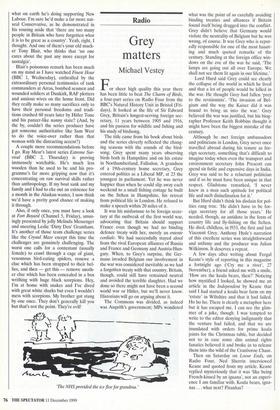Radio
Grey matters
Michael Vestey
For sheer high quality this year there has been little to beat The Charm of Birds, a four-part series on Radio Four from the BBC's Natural History Unit in Bristol (Fri- days). It looked at the life of Sir Edward Grey, Britain's longest-serving foreign sec- retary, 11 years between 1905 and 1916, and his passion for wildlife and fishing and his study of birdsong.
The title came from his book about birds and the series cleverly reflected the chang- ing seasons with the sounds of the bird- song; Grey spent many years observing birds both in Hampshire and on his estate in Northumberland, Fallodon. A grandson of a 19th-century home secretary, Grey entered politics as a Liberal MP, at 23 the youngest in parliament. Yet he was never happier than when he could slip away each weekend to a small fishing cottage he built on the Itchen in Hampshire, his retreat from political life in London. He refused to make a speech within 20 miles of it.
It was his misfortune to be foreign secre- tary at the outbreak of the first world war, advocating that Britain should support France even though we had no binding defence treaty with her, merely an entente cordiale. We had successfully stayed aloof from the rival European alliances of Russia and France and Germany and Austria-Hun- gary. When, to Grey's surprise, the Ger- mans invaded Belgium our involvement in the war was considered inevitable as we had a forgotten treaty with that country. Britain, though, could still have remained neutral and avoided the terrible slaughter. Had we done so there might not have been a second world war or Hitler, but we'll never know. Historians will go on arguing about it.
The Commons was divided, as indeed was Asquith's government; MPs wondered
'The NHS provided the ice floe for grandma.'
what was the point of so carefully avoiding binding treaties and alliances if Britain found itself being dragged into the conflict. Grey didn't believe that Germany would violate the neutrality of Belgium but he was wrong, of course. It was Grey who is reput- edly responsible for one of the most haunt- ing and much quoted remarks of the century. Standing at the foreign office win- dows on the eve of the war he said, 'The lamps are going out all over Europe. We shall not see them lit again in our lifetime.' • Lord Hurd said Grey could see clearly the collapse of the world in which he lived and that a lot of people would be killed in the war. He thought Grey had fallen 'prey to the revisionists'. 'The invasion of Bel- gium and the way the Kaiser did it was bound to bring us into the war.' Grey believed the war was justified, but his biog- rapher Professor Keith Robbins thought it might have been the biggest mistake of the century.
Although he met foreign ambassadors and politicians in London, Grey never once travelled abroad during his tenure as for- eign secretary, something that's difficult to imagine today when even the transport and environment secretary John Prescott can spend six futile and expensive days in India. Grey was said to be a reluctant politician and if so he must have been unique in that respect. Gladstone remarked, 'I never knew in a man such aptitude for political life and such disinclination for it.'
But Hurd didn't think his disdain for pol- itics rang true. 'He didn't have to be for- eign secretary for all those years.' He needed, though, an antidote' in the form of country life and fly-fishing on the Itchen. He died, childless, in 1933, the first and last Viscount Grey. Anthony Hyde's narration of this excellent series was straightforward and unfussy and the producer was Julian Wilkinson. It deserves a repeat.
A few days after writing about Fergal Keane's style of reporting in this magazine a fortnight ago ('Cry me a river', 27 November), a friend asked me with a smile, 'How are the koala bears, then?' Noticing how mystified I looked, he showed me an article in the Independent by Keane that said I had started a koala bear farm on my 'estate' in Wiltshire and that it had failed. Ho ho ho. There is clearly a metaphor here but it has escaped me. I can see the glim- mer of a joke, though. I was tempted to write to the editor denying indignantly that the venture had failed, and that we are inundated with orders for prime koala joints for the Christmas table, but decided not to in case some dim animal rights fanatics believed it and broke in to release them into the wild of the Cranbome Chase.
Then on Saturday on Loose Ends, on Radio Four, Ned Sherrin interviewed Keane and quoted from my article. Keane replied mysteriously that it was 'like being French-kissed by an iguana', not an experi- ence I am familiar with. Koala bears, igua- nas ... what next? Piranhas?


























































































 Previous page
Previous page